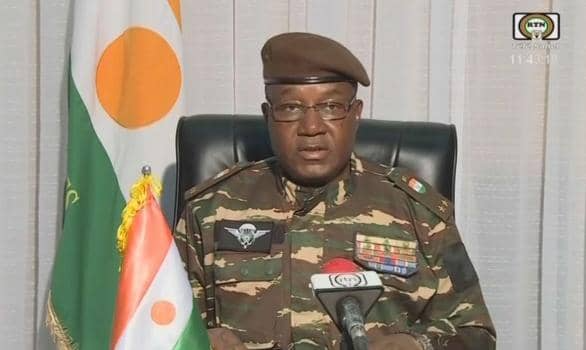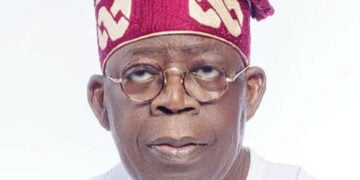The bugbear of military coups has once again beset another beleaguered country in the West African sub-region. This time the whirlwind of coup d’ etat hit the Republic of Niger when a group of soldiers on Wednesday, July 26, 2023, toppled the democratically- elected government of Mohammed Basoum and seized power in the country.
A stunned world watched in consternation about the saddening situation in Niger because West Africa is still grappling with how to return democratic order in three countries within the region (Guinea, Mali, and Burkina Faso) which had their democracies truncated by military intervention.
Niger is a landlocked country struggling with two Islamist insurgencies – one in the south-west, which swept in from Mali in 2015, and the other in the south-east, involving jihadists based in north-eastern Nigeria.
Militant groups allied to both al-Qaeda and Islamic State are active in the country. So, when news filtered in that another coup had taken place in Niger, making it the fourth successful coup in the sub region in the last three years, anxiety gripped members of the international community.
The Economic Community of West African States (ECOWAS), the United Nations (UN) , the European (Union), the African Union (AU) and some member countries of the international community have all risen in fury against the undemocratic takeover of power by the army in Niger. They have condemned the act and threatened sanctions against the plotters.
However, the soldiers who seized power and held President Basoum hostage have remained adamant and on Friday announced 62-year Abdourahmane Tchiani, head of Niger’s presidential guard as leader of a transitional government in the West African country and head of state. The plotters insist that the coup was carried out to stem ‘the gradual and inevitable demise’ of the country.
Tchiani made the announcement on Friday on state-run television, saying he was the “president of the National Council for the Safeguard of the Homeland”. The general also said that while Bazoum had sought to convince people that “all is going well, the harsh reality is a pile of dead, displaced, humiliation and frustration”.
“The security approach today has not brought security to the country despite heavy sacrifices,” Tchiani said even as he refused to mention a timeline for return to civilian leadership.
The Federal Government of Nigeria led by President Bola Tinubu who is the chair of the ECOWAS Authority of Heads of State and Government, has strongly condemned the coup d’etat. The Nigerian government said that the unconstitutional change of government is unacceptable in a time where concerted efforts are being made to stabilize the sub-region and uphold the principles of democracy and good governance.
“In line with the pronouncement of the Chair of ECOWAS Authority of Heads of State and Government, Nigeria calls for the immediate and unconditional release of President Mohamed Bazoum, his family members and other civilians being detained; and reversion to status quo ante.
“Nigeria welcomes and appreciates the support of the larger international community in urging the military authorities in Niger to respect the will of the people and return the country to constitutional order immediately,” a statement issued by Francisca K. Omayuli Spokesperson, Ministry of Foreign Affairs said on Thursday.
In a similar development Former Secretary General of the Commonwealth, Chief Emeka Anyaoku condemned the coup and warned Nigeria to be conscious of events in the neighbouring country.
The former Nigerian Minister of External Affairs, gave this warning while chairing the 5th Annual Lecture/Conference of the Association of Foreign Relations Professionals of Nigeria (AFRPN), which was held in Abuja on Thursday.
He said “Well what had happened in Niger should be of major concern to us here in Nigeria, on a number of grounds. The first is that we thought that we have seen the end of military coup, and end of unconstitutional change of government and so what had happened is a surprise which we should condemn.
“We should also work towards putting Niger Republic back to a constitutional form of government. Niger is one of our neighbours, so what happens there is bound to affect the security and stability in our own country. The elements involved in the destabilization of Niger are not far from Nigeria. So, we should be very cautious,” he said.
It is disheartening that at the time West Africa is trying to consolidate democracy; there is an increasing spate of coups and the negative consequences on development in West Africa.
There are varied causes of these military interventions and West Africa should heed the call of former South African President Thabo Mbeki, who called for the need to implement the preventive policies of the African Union.
He said “the re-emergence of the phenomenon of military coups or military interventions on our continent has emphasised the importance of the implementation of the preventative policies of the AU, as well as interventions to help ensure the popular legitimacy of the democratic systems we establish in our countries.
“I have just tried to highlight what has been called ‘the primacy of the political’ in the solution of the conflicts on our Continent. This means that the process of conflict resolution must include getting to the roots of every conflict with a view to ensuring that such conflict does not recur.”
Finding solutions to the spate of coups in the region, the Chief of Staff to the Liberian Armed Forces, Maj-Gen. Charles Johnson III, said that the powers of Presidential Guards must be limited in order to prevent more incidences of Coup d’etat in the ECOWAS region.
Johnson made this known while speaking with journalists on Thursday on the side-lines of the joint delocalized meeting of the ECOWAS Parliament’s Joint Committees on Political Affairs, Peace, Security and the African Peer Review Mechanism, Judicial Affairs and Human Rights, Social Affairs, Gender and Women Empowerment in Monrovia.
Johnson, who delivered a paper on the topic “The Role of the Armed and Security Forces in Political Government: The Cases of Mail, Burkina Faso, and Guinea, Lessons to be learned and Prospects,” said that member states must be mindful of how much control the military has.
He said “So, if you look at what is happening even in Niger yesterday, it is the Presidential guards. And look at our history in Liberia, we have seen the issue of Presidential guards being misused.
“The Peace and Reconciliation Report of 2008 says that the Special Anti-Terrorism Unit was involved in a lot of alleged atrocities according to the report.
“That is why I emphasized that we need to be mindful and allow the military to have this control.
“When you have this political interference into the command and control of the military, like having a Presidential guard, the Commander in Chief selecting somebody to head it instead of allowing the CDS, Chief of Defense Staff DS to go through that process or having somebody to control, then it becomes a problem.”











